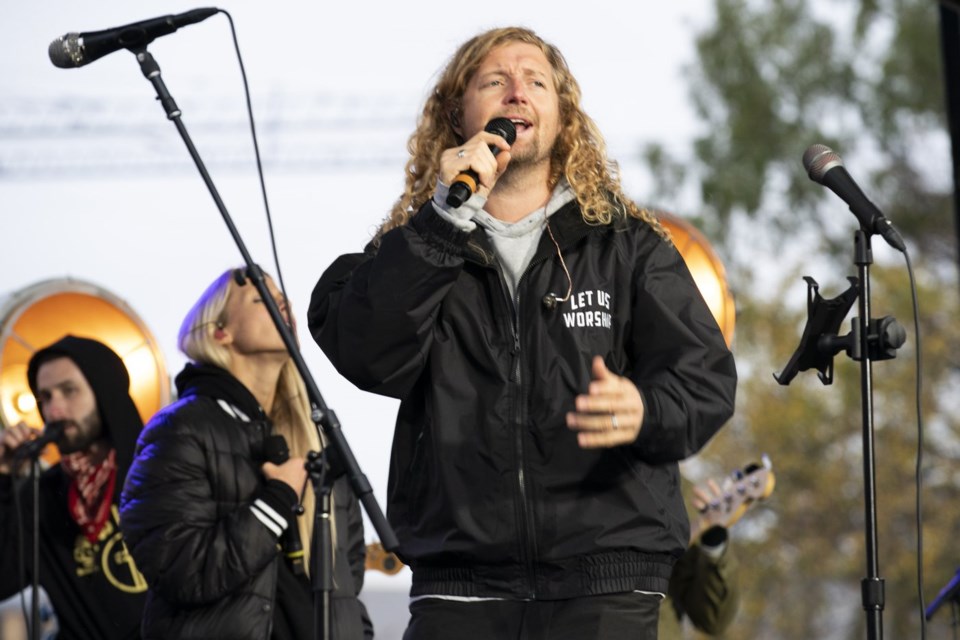MONTREAL — Sean Feucht, a Christian singer and rising star in the MAGA movement, has been censored and mistreated during his Eastern Canadian tour, say civil liberties experts and a religious group.
All six of the concerts scheduled last week were cancelled, forcing him to seek alternative venues. In Montreal, a church allowed Feucht on Friday to perform a hastily scheduled concert over the objections of the city administration, and is now facing a $2,500 fine.
Officials cancelled his shows because of the singer's political and religious opinions, says a group that represents 500 evangelical Protestant churches in the province.
"While the criticism of ideas is legitimate in a democracy, state censorship of those ideas represents a dangerous deviation," Jean-Christophe Jasmin, a spokesperson for the Réseau évangélique du Québec, said in a statement.
The Christian singer describes himself as a musician, missionary, author and activist. He has spoken out against "gender ideology," abortion and the LGBTQ+ community, and his religious and political views have grabbed the attention of U.S. President Donald Trump's administration. The Atlantic magazine recently described Feucht as a Christian nationalist who has become a "MAGA superstar."
In a statement, a spokesperson for the City of Montreal says the church didn't have a permit to organize the concert, adding that the show went against the "values of inclusion, solidarity, and respect" that define Montreal.
But Jasmin says the event should not have required a permit at all because it was part of a routine religious gathering. And while he says his group doesn't support the singer or his views, it's concerned with what it sees as an attack on religious expression.
Since the incident, he said, church leaders in the city have been calling to ask if they could also face fines for hosting concerts. "It's not the state's place to determine how our churches ought to conduct themselves," Jasmin said.
The City of Montreal did not immediately respond to a question about whether all churches should request permits when they want to hold concerts.
Complaints about Feucht have led officials to cancel his other shows scheduled in Eastern Canada -- decisions that free speech advocates in the country say were violations of the Charter. "His freedom of expression, freedom of assembly and freedom of religion rights have all been violated," said Josh Dehaas, legal counsel for the Canadian Constitution Foundation.
“The government doesn't get to decide what ideas people can hear and what things people can say and how people can choose to worship and that's what they're trying to do in this case,” he said in an interview.
Dehaas said the foundation would be interested in supporting Ministerios Restauración Church in a Charter challenge of the $2,500 fine.
James Turk, director of the Centre for Free Expression at Toronto Metropolitan University, said it raised “red flags” to see public bodies revoking Feucht’s concert permits.
“I'm totally opposed to his position on most political things,” he said. “But in a democracy, we deal with difference through discourse, through argument, through boycotting, through ignoring, through protest. We don't deal with it through silencing people and censoring them.”
On Sunday, Independent Sen. Kristopher Wells, a longtime LGBTQ+ advocate, waded into the fray, stating on X that Feucht “has no Charter right to have his shows hosted at public facilities, which must be safe and discrimination-free spaces that uphold community standards.”
In a statement to The Canadian Press, Wells said, "this has nothing to do with his freedom of expression, which is subject to reasonable limitations in Canada, and everything to do with ensuring community safety and standing up for human rights."
But Dehaas disagreed, saying governments cannot “discriminate on who can use a public space based on the viewpoint of the speaker who wants to protest or worship or sing in that space.”
“The senator is wrong here,” he added.
On social media, the singer has accused Canada of tyranny and censorship, and has questioned whether the Charter of Rights and Freedoms “still means anything.”
Feucht says his “Revive in 25” tour is about worship and spiritual restoration. But he has previously spoken out against "gender ideology," abortion and the LGBTQ+ community. In a February video on Instagram, in response to a protest in support of gender-affirming health care, Feucht said the protesters were angry because they were “prohibited from cutting off the body parts of children.”
Last year, Feucht referred to Pride Month as a time to discover “which people, businesses, influencers, corporations & ministries have sold their soul to a demonic agenda seeking to destroy our culture and pervert our children.”
Still, Dehaas said even if there were concerns that Feucht might engage in hate speech during his concerts, “there's no legal mechanism to shut down his show in advance.”
Feucht has returned to the U.S. following his concerts in Eastern Canada, but is scheduled to return in August for a series of shows in Western Canada.
This report by The Canadian Press was first published July 28, 2025.
Miriam Lafontaine and Maura Forrest, The Canadian Press




